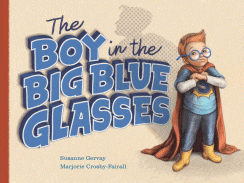
The Boy in the Big Blue Glasses
The Boy in the Big Blue Glasses
Susanne Gervay
Marjorie Crosby-Fairall
EK Books, 2019
32pp., hbk., RRP $A24.99
9781925335996
Superhero Sam has had to get glasses – big blue ones – but he doesn’t like them. They make his ears hurt and even though, his well-meaning parents and grandparents and even his teacher say he looks handsome in them, he hates that. It’s as though it’s all about his glasses and he, himself, is invisible. They make such a fuss about this new superhero, it’s as though they’ve forgotten the old superhero he was before.
His best friend George still knows him and plays with him though, but then the day comes when George is not at school and the other children start to make fun of him…
Every now and then you pick up a story that really resonates with you and Sam was me 60+ years ago, my son 40 years ago and my granddaughter seven years ago. Each of us had to go through the trauma of appearing in public wearing glasses, and despite the well-intended comments of others, it’s tricky to know who you are when you don’t recognise yourself in the mirror but you know you are still you inside.
Sam is just one of hundreds of other kids who face this situation, and author Susanne Gervay is well-known for taking those everyday but confronting situations and putting them into the spotlight so the extraordinary becomes ordinary, and inspiring hope for happiness ahead. No one likes to be different when they are little and wearing glasses seems like a huge placard that tells others you are not 100% perfect and that somehow you are less than the other children in your class. Yet inside you know you are just the same person you were the day before when you didn’t have glasses.
Superbly and sensitively illustrated, this is a book that not only belongs in any collection for young readers and which should be actively promoted because so many children will see it as a mirror and learn to love reading even more as they read about themselves. Others might see it as a window and begin to understand how self-conscious Sam and others feel and how they can be more empathetic, rather than unkind like the children in the story who call Sam “googly-eyes” and “pufferfish”. It might even be an opportunity to explore other “disabilities” and the sorts of ways that science and technology can now assist in overcoming them comparing the advances to the days when no such help was available and life became a misery.
Excellent, down-to-earth, and one for everyone, glasses or not!